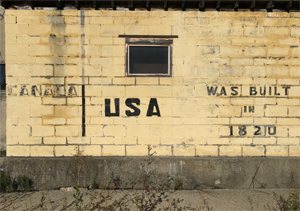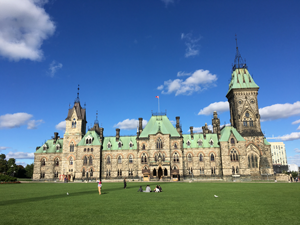I have traveled with Center for Immigration Studies (CIS) on three of the last five border tours they have organized to study the US / Mexico border.
So, I can honestly say I was really looking forward, with great anticipation, to the latest trip, my fourth, to the US / Canadian border in September
CIS does an outstanding job putting together the best, most in-depth tours of our border. Their dedication to providing a wide array of "real life" representatives that live and work in the area that can tell us their own stories about the border and the issues they face on a daily basis make the trip invaluable.
Strategic stops are planned, allowing us to explore key locations along the route traveling east from Ottawa, traversing the US / Canada border exploring the New York, Vermont and Quebec border regions.
The weather was near perfect and I'm fairly certain CIS most likely planned for that, as well.
CIS border tour groups are small, with just 9 guests and 3 CIS staff members traveling in two SUV's. CIS takes great care to make certain that all our wordly needs are met - often going to extraordinary measures to accommodate us.
Upon our return, CIS Assistant Director, John Wahala provided an outstanding, detailed write up of our experience - complete with some of his photos!
-------------------------------------------------------------------------------------------------------------------
The Center for Immigration Studies recently completed its sixth border tour. Heading north for the first time, we began our trip in Ottawa. From there we traveled east, crisscrossing nearly a thousand miles over the waterways and rolling hills of upstate New York and Vermont and into the lush forests of Quebec. The geography and relative calm of the region is a stark contrast to the rugged terrain and volatility of the U.S. Southwest. But behind the bucolic charm a host of factors are at work to make securing this part of the border just as challenging as the more trafficked parts.

Cooperation along the northern border is good. Every official we spoke with, currently serving or retired on either side of the border, praised the binational relationship that exists. The United States and Canada work together to apprehend people and illicit goods moving in both directions. Unlike enforcement efforts in the Southwest, where communication with Mexican counterparts is often strained or nonexistent, the relationship with Canada appears to be one of mutuality and respect.
Policies and procedures, however, have tightened since the 9/11 terrorist attacks. The casual nature of the relationship no longer exists. A retired border agent told us he used to routinely cross into Canada, where it was less populated and he could cover ground more quickly, before reentering the United States in pursuit of fugitives. No approval at a port of entry was necessary. Local residents tell their own stories about crossing back and forth for various reasons, unmolested. That does not happen any more.
During our excursion we crossed several times and each time we were questioned rigorously. Canadian border officials are thorough and have more information to work with than their predecessors. The United States and Canada now share the criminal histories of their respective citizens using various databases, such as those run by the Federal Bureau of Investigation and the Canadian Police Information Centre. The data is available to officers at every port of entry, who use it in making the decision whether or not to deny entry. That decision is based, in part, on how a past crime would be treated under Canadian law, which differs from the American legal system. Thousands of Americans have been refused admittance as a result of this information sharing, sometimes for infractions that happened decades ago.
The diligence we saw at the ports of entry was also evident along unpopulated stretches of the border, where only small stone markers separate the two countries. A few times when our group stopped to look around, agents came quickly to check on what we were doing. When they did not come, we were told by our guides that we were being monitored by sensors.
In one spot, a member of the Border Patrol told us they regularly interdict aliens attempting to cross into Canada. Typically these individuals are from various parts of Asia who are trying to reunite with family members. Two officers of the Royal Canadian Mounted Police, who spoke with us on the Quebec side, said they had just intercepted a dozen Middle Easterners heading north from Vermont earlier that morning. They said they detain illegal aliens from all over the world, but that most are probably from Africa. Many are drawn to Canada because of its generous asylum policies.
The seeming effectiveness of law enforcement at this section of the border is aided by a lighter flow of illegal traffic. One agent told us that the young officers in the Border Patrol all want to be down south where the action is intense. He reflected on his own time in Calexico, where he was constantly being confronted with drug runners and human smugglers. Last year's apprehension data confirms this sentiment. Only 632 arrests were made in the Buffalo and Swanton sectors, which include the New York and Vermont portions of the border, compared to nearly 150,000 in the Rio Grande Valley of Texas.
But patrolling the northern border is not without its challenges. The Swanton sector has the most drug interdictions on the northern border. It is home to the St. Regis Mohawk Indian Reservation — called Akwesasne in the native language. The reservation is small, with only a few thousand residents, but authorities say it creates a big hole in security. Questions of tribal sovereignty are complicated by the proximity to the international border and the unique geography of the region. Tension between tribal authorities, state and local officials, Border Patrol and other U.S. government agencies, and the Canadian government has long existed.
One flash point is the reservation's tax exemption on tobacco, which turned into a profitable opportunity for smugglers when governments began placing large excise taxes on cigarettes in the 1990's. It has been reported that tens of millions of cigarettes pass through the reservation each year, many headed into Canada. Agents are tasked with stopping this illicit flow on "a sprawling beat that includes countless coves, side roads and dimly lit cottage developments" that extends onto a narrow peninsula called the snye by locals. It is a small land mass that juts into the St. Lawrence River that is officially part of Quebec but is surrounded by water on three sides and the United States on the fourth. This makes law enforcement difficult. A retired agent told us it is rarely patrolled, making it a haven for people smugglers and others running from the law. He declined to take us into the snye, saying the last time he was there was the late 1980's and he was shot at.

In addition to contraband cigarettes, a steady stream of marijuana comes south into the United States through the reservation and harder narcotics, including a recent resurgence of heroin, and firearms are smuggled north into Canada. These endeavors rely on a dangerous criminal enterprise that works in tandem with people-smuggling networks. Aiding this enterprise is the dismal employment situation at Akwesasne, which helps lure many tribal members into this line of work. The situation is not unlike that of the Tohono O'odham Nation reservation on the Arizona border, which we visited during a previous tour. Further complicating the situation at Akwesasne is an internal tribal conflict. Ongoing friction between a traditional faction and a "warrior" sect creates a challenge to governance and how the reservation deals with outside authorities. The warrior sect is said to run the gaming casino and to be involved with illicit smuggling operations.
There are other issues on this seemingly tranquil stretch of the border. Over the past several years, Vermont's dairy industry — like much of the nation's agricultural sector — has transitioned their workforce to migrant laborers. The workers, most of whom are here illegally from Mexico and Central America, significantly cut operating expenses. The farmers echo the familiar refrain that they cannot find locals who are willing to work. That claim is plausible and understandable given their demands. One report said the migrants work 84 hours a week, 52 weeks a year. They are housed in bunkers or camps, tucked away from socialization with the outside world. This makes law enforcement efforts to intervene difficult. It is an unhealthy arrangement of alienation and exploitation that creates the predictable deleterious effects of increased crime and social dysfunction. Recently a Vermont state senator was indicted for a prostitution scheme involving migrant workers. Despite the problems of such an arrangement poses for everyone, the illicit use of migrant labor has the support of politicians at the highest levels of government who are beholden to powerful special interests. Fortunately, some farmers are beginning to recognize the harm and are mechanizing their operations with robots, which are more efficient and more profitable in the long term.
Another immigration scandal that has beset the region is a visa scam that bilked foreign investors out of hundreds of millions of dollars. In exchange for the promise of green cards, these individuals paid for two ski resorts and a biotechnology center that were supposed to create thousands of jobs and revitalize impoverished northern Vermont. The developers took the money, but the projects were never realized. We stopped by the site of one of these projects in Newport, which now sits as a large hole in the ground, and talked to a local about the fallout of the scam. Our colleague David North has written extensively on this and other such visa scams that have occurred in the EB-5 investor program, which have beset various places across the country.
The problems on this part of the northern border are different in scale from those on the southern border, but not in kind. A predictable mix of inconvenience, vulnerability, crime, desperation, and exploitation can be found, like everywhere else there is an international boundary. It helps somewhat that both the United States and Canada are developed countries, largely eliminating the desire for established residents to cross illegally. But such calm is offset by the ease of overseas travel. People from around the world are now able to get to this section of the border and they are enticed to do so by the conflicting messages sent by both governments. This gets us to the most pressing border problem, which is not how to maintain order, but determining whether it is still politically desirable to do so.

Western elites are experiencing a crisis of confidence that is challenging long-held notions of national sovereignty. The political class has largely abandoned the conviction that immigration should be restricted. The view that there ought to be open borders now predominates among leaders in both the Republican and Democratic parties, much to the chagrin of the American people. The same dynamic is present in Canada. There was a sense of resignation from the two RCMP officers we spoke to in Quebec when they explained that most of the illegal crossers they detain get asylum. It was the same resignation that was voiced by two Border Patrol agents who told us that morale is terrible, turnover is high, and their superiors will not even furnish them with adequate equipment. And it was the same resignation we heard from a retired agent who succinctly put it: "We enforce the law, but there are no consequences." The Obama administration has resettled hundreds of thousands of illegal crossers into the United States — in direct violation of the law and the mission of the Border Patrol — in just the past couple years.
Former Canadian Ambassador James Bissett, a high ranking immigration official for more than three decades who served as an aide to prime ministers, met us for dinner one night in Ottawa. After sharing a detailed history of immigration to his country, he discussed the transformation that is now underway. Since 1985, Canada's population has increased by 40 percent — the largest increase of any developed country. Certain areas have experienced near total demographic replacement. The current Liberal Party government of Justin Trudeau, along with nearly all of the political opposition, has embraced this transformation, pledging to admit record numbers of immigrants, including tens of thousands from the Middle East. Next month they will waive visa restrictions for Mexico, creating a host of challenges for themselves and the United States. There is concern, even among some sympathetic members of the elite, that such policies are endangering the security of the region.

Mass immigration is no longer a distinctly American phenomenon. It has become the de facto position of Canada and many other western governments. The leaders who are pushing it see the free movement of people as a human right, one that is part of an emerging globalist perspective on governance. That perspective is directly at odds with the worldview of most of their citizens, creating a bitter conflict that goes right to the heart of what it means to have the consent of the governed. The rise of nationalism in Europe, the British decision to leave the European Union, and the populist surge of Donald Trump are all recent manifestations of the peoples' simmering discontent. Meanwhile, law enforcement officials on both sides of the Canadian border quietly do their jobs, leaving the more philosophical questions to their political leaders, and the voters.
Learn more about CIS - visit the Center for Immigration Studies website.